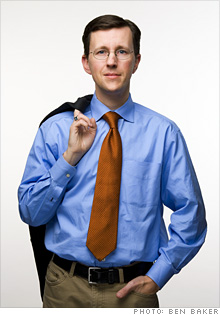(Money Magazine) -- As the 10th anniversary of the bursting of the tech bubble is upon us, you've probably read a slew of stories about what an awful decade this has been for stocks.
But what drives me nuts is that despite all this press, there's still very little discussion about why stocks have stunk since the market crashed in March 2000.
 |
| Pat Dorsey is the director of equity research for Morningstar. |
| MMA | 0.69% |
| $10K MMA | 0.42% |
| 6 month CD | 0.94% |
| 1 yr CD | 1.49% |
| 5 yr CD | 1.93% |
The reason is simple: A decade ago most equities were insanely expensive. Even shares of boring blue-chip companies were trading at frothy price/earnings ratios of 40 or 50 -- a fact that sometimes is forgotten because so many of our memories of the go-go '90s center on profitless outfits like Pets.com.
Those frothy valuations turned out to be an enormous headwind to equity returns because they reflected sky-high expectations that only a ridiculous rate of earnings growth could have met.
A perfect example is Wal-Mart (WMT, Fortune 500). In 2000 the world's biggest retailer traded at a P/E of 42.5, which is steep for such a mature firm. That year the company earned $1.25 a share. Multiply that by the P/E, and you get a share price of around $53.
Over the past decade Wal-Mart's earnings have nearly tripled, to $3.41 a share, a solid annual growth rate of 12% (that's just a tad lower than the company's 14% growth rate in the mid- to late '90s).
But because profit expectations were set so high, investors wound up punishing Wal-Mart by cutting its P/E at about the same pace that the firm's earnings expanded. As a result, Wal-Mart's stock price has pretty much gone nowhere even though the company has delivered solid results.
This is the tyranny of valuation in its simplest form. Nothing affects your future returns more than the price you pay for your investments.
I want to drive this point home because investors appear to be making the same mistake today -- only with a different investment.
Consider this: In 1999, Americans shoveled nearly $200 billion into equity funds when stocks traded at 40 times earnings. At the same time, they yanked $4 billion out of bond funds when 10-year Treasuries were yielding around 6%.
Today it's just the opposite. Investors pulled about $4 billion out of stock funds over the past year even as P/Es fell to 20 (that's not cheap on an absolute basis, but it's a better deal relative to a decade ago). Meanwhile, they poured around $300 billion into bond funds after demand for Treasuries had grown so much that yields fell to less than 4%.
Now, I can't say whether the next decade will be as bad for stocks -- or as good for bonds -- as the past 10 years were. But I do know the tradeoff today between equities and fixed-income investments is very different than it was in March 2000.
For instance, because investors aren't paying record prices for stocks anymore, profit expectations won't be nearly as high as they were a decade ago. However, because you're paying frothier prices for government bonds, the bar will be set higher for Uncle Sam's financial performance. So ask yourself how confident you are in the government's balance sheet. ![]()



| Overnight Avg Rate | Latest | Change | Last Week |
|---|---|---|---|
| 30 yr fixed | 3.80% | 3.88% | |
| 15 yr fixed | 3.20% | 3.23% | |
| 5/1 ARM | 3.84% | 3.88% | |
| 30 yr refi | 3.82% | 3.93% | |
| 15 yr refi | 3.20% | 3.23% |
Today's featured rates:



| Index | Last | Change | % Change |
|---|---|---|---|
| Dow | 32,627.97 | -234.33 | -0.71% |
| Nasdaq | 13,215.24 | 99.07 | 0.76% |
| S&P 500 | 3,913.10 | -2.36 | -0.06% |
| Treasuries | 1.73 | 0.00 | 0.12% |
| Company | Price | Change | % Change |
|---|---|---|---|
| Ford Motor Co | 8.29 | 0.05 | 0.61% |
| Advanced Micro Devic... | 54.59 | 0.70 | 1.30% |
| Cisco Systems Inc | 47.49 | -2.44 | -4.89% |
| General Electric Co | 13.00 | -0.16 | -1.22% |
| Kraft Heinz Co | 27.84 | -2.20 | -7.32% |
|
Bankrupt toy retailer tells bankruptcy court it is looking at possibly reviving the Toys 'R' Us and Babies 'R' Us brands. More |
Land O'Lakes CEO Beth Ford charts her career path, from her first job to becoming the first openly gay CEO at a Fortune 500 company in an interview with CNN's Boss Files. More |
Honda and General Motors are creating a new generation of fully autonomous vehicles. More |
In 1998, Ntsiki Biyela won a scholarship to study wine making. Now she's about to launch her own brand. More |
Whether you hedge inflation or look for a return that outpaces inflation, here's how to prepare. More |